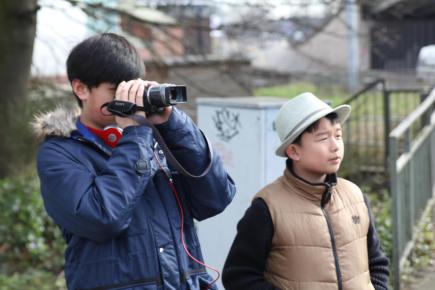MM caught the debut of an experimental film exploring through the narrative of two teenagers what it’s like to be both British and Chinese in Manchester as the children of migrant parents.
Documented over two years, the boys were aged 10 and 12 at the start of filming, and it follows their experiences at home, at school, and at the community centre where they volunteer and learn Chinese.
Project leader and co-producer Dr Elena Barabantseva’s research gave life to the film as a lecturer in Chinese Politics at the University of Manchester.
Debuted at the Central Library with a post-film discussion, this 46-minute project sought to open up a dialogue around the interchangeable: identity and belonging.
Thoughtfully opened with idyllic scenes of the iconic China Town, sporadic prongs of an elegant string instrument symbolised Chinese culture.
It gave us the perfect lead into our main characters, Kevin and Daniel, their families, and Jenny Wong, Director of the Manchester Chinese Centre – where both boys volunteered at the time.
A mother-figure and almost a second narrator to the film, Jenny acted as the bridge between all that is Mancunian and all that is Chinese, weaving her insight throughout into the attitudes and values of the Chinese community.
As she did, I could sew together my perception of ‘Chineseness’ through observation with actual knowledge from the source.
Though the cast is small, you’d be wrong to think this film is any less informative as it picks at what Kevin termed the ‘BBC’ experience – ‘British Born Chinese’.
You’re educated further about this through the boys’ own articulate ramblings during self-captured footage and video diaries while playing the anime game Dragonball Z, or at Tai Chi – an activity which carries huge cultural importance.
Used to documentaries that ceremoniously pose then answer the questions they present, I grappled with the fact that as I watched the very everyday occurrences of these two young boys, there was no fulfilling round-up to satisfy the many ideas that cropped up.

‘THE POIGNANCE WAS IN ITS SIMPLICITY’: Director Andy Lawrence said that the lack of ‘driving narrative’ is a positive
Director Andy Lawrence, visual anthropologist and filmmaker in residence at All Rites Reversed, defended its ‘experimental reflexive and participatory style’.
He said: “You would have noticed that there’s not a driving narrative through the film, there’s not a single expert saying how things are. Elena is a guide to our journey and she introduces us to some ideas but she’s not really defining our experience of the film.
“It’s to try and bring the audience as close as possible to the experience of others and then in some way break down those barriers that exist between us so we can find a way to be in the world, despite how we feel elevated or subjugated by our relationship with others.”
In hindsight, I understood why it had to be done this way and felt the poignance of the documentary’s narrative was in its simplicity.
From the comments shared after the screening, it was clear that the Chinese community here had never been shown how their own challenges as migrants had manifested within their children.
Bound by virtue and politeness, these conversations were unlikely to ever have been given such a public forum, placing more importance on the need to bring them into public consciousness through the voices of the community itself.
For those Chinese individuals in the audience, including guests PP Wong, the first British-born Chinese novelist to secure a publishing deal in the UK for The Life of a Banana, and Dr. Véronique Pin-Fat, Senior Lecturer in International Politics at the University of Manchester – the documentary was cathartic and representative of all their collective stories.
What you learn from the documentary is that there’s an inherent challenge to marry the culture you’re born into, with the one that you exist and grow up in, but also that the minority experience is a rich one.
A single shot encapsulated this entire beautiful struggle – a wide angle capture of Daniel centre-frame plucking on the strings of the ancient Chinese instrument ‘guqin’, with his parents and two other elders poised behind him on either side, just watching.
An unspoken obligation to observe the traditions of his Chinese heritage, yet to go to school tomorrow in Whalley Range and be the minority.
For more information on British Born Chinese click here.



